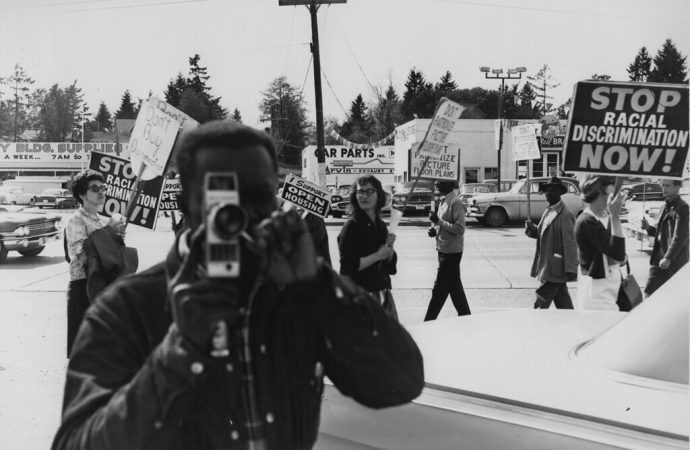The history of liberal democracy has witnessed student protesters occupying the offices of local draft boards in protest of the Vietnam war and civil rights protestors engaged in illegal sit-ins, pray-ins and marches to repeal the Jim Crow laws that enforced racial segregation and to stop the de facto disenfranchisement of African-American citizens.
In recent years, we have also witnessed the citizens of Ferguson, Missouri storm the Saint Louis City Hall to protest racial injustice in the wake of the killing of an unarmed black 18-year old, Edward Snowden leak classified information from the NSA to reveal their mass-surveillance and anti-abortion activists vandalize clinics. Citizens break the law in protest of what they believe is unjust or wrong. Citizens disobey the rules.
Civil disobedience
Civil disobedience is a term coined by Henry David Thoreau. In his essay from 1849, he defended his refusal to pay taxes because they paid for the state’s warfare and the upholding of slavery. Civil disobedience was later defined with more precision by John Rawls as a “…a public, nonviolent, conscientious yet political act contrary to law usually done with the aim of bringing about a change in the law or policies of the government” in Rawls’ influential work A Theory of Justice from 1971. Today, scholars continue to debate the specifics of the concept (for further discussion of the concept see Brownlee, K. 2012; Milligan, T. 2017; Smart, B. 1991).
Civil disobedience is not only conceptually interesting but engaging in civil disobedience in a liberal democracy also raises a moral problem. On the one hand, civil disobedience can help relieve great injustice and inhibit moral wrongs. On the other hand, it is part of the democratic ideal that we ought to respect the outcome of democratic decision-making procedures as legally binding, even when we disagree with that outcome and think it is unjust (see for example Christiano, T. 2008; Estlund, D. 2008).
With civil disobedience, an interesting philosophical question arises: how are we to reconcile the idea that civil disobedience is sometimes morally justified with the idea that citizens of liberal democracies ought to respect the opinion of their fellow citizens and follow democratically enacted laws, even when these laws are unjust or wrong?
The liberal school of civil disobedience
The question came to the fore in political philosophy in the late 1960s and early 1970s in the wake of the civil rights movement protests and student protests against the Vietnam war. Prominent philosophical and legal scholars such as John Rawls (Rawls, J. 1971) and Ronald Dworkin (Dworkin, R. 1997) developed theories of civil disobedience that promised to release the tension between democracy and disobedience. Their theories are rooted in a liberal tradition. To liberal theorists, there are limits to democratic authority: there are fundamental rights that a democratic majority cannot legitimately violate. Civil disobedience is justified when it is used to protest democratic majorities overstepping their authority by violating fundamental rights.
Rawls, for example, argues that civil disobedience is only justified when used to fight clear violations of liberty rights, further provided that dissenters have already tried the legal channels of political participation that are available in a liberal democracy to no avail and that they accept their punishment for breaking the law. This way, citizens engaging in civil disobedience can show their fidelity to the democratic constitution, even though they break the law to promote justice. Rawls thus limits justified civil disobedience to cases where a democratic majority has implemented a law that violates a basic liberty right and thus oversteps its authority. In those situations, it is less problematic when dissenters flout democratic processes to redress such rights violations.
The democratic school of civil disobedience
A democratic school of civil disobedience has recently emerged as a response to the liberal theories. Exponents of the democratic approach criticize liberal theories for excluding disobedience addressing democratic deficits and thus for failing to account for many of today’s global protests against global governance institutions such as the IMF (International Monetary Fund), the WTO (World Trade Organization) or the EU (European Union) (Markovits, D. 2005; Dupuis-Déri, F. 2007).
In contrast with liberal theories, democratic theories conceive civil disobedience as a democratic practice and an integral part of the democratic process itself. They argue that civil disobedience is justified when it is used to remedy failures in democratic processes (See for example Markovits, D. 2005; Smith, W. 2011).
Drawing on Habermas’ theory of deliberative democracy (Habermas, J. 1996), Smith (Smith, W. 2011), for example, argues that civil disobedience is justified as a method of remedying democratic failures described as ‘deliberative inertia’. Deliberative inertia occurs when certain discourses, i.e. tacit assumptions that frame discussion, hinder alternative political viewpoints and proposals from being considered in the public sphere. Deliberative inertia becomes problematic when the alternative viewpoints in question provide better answers to our political problems or shine a light on important political matters that are otherwise neglected. Examples of disobedience aimed at overcoming deliberative inertia include the protests against the austerity discourse of international institutions such as IMF and the World Bank.
According to this democratic theory, civil disobedience is also justified in fighting another type of deliberative inertia: when a political view that enjoys wide public support is not being considered by policy-makers and legislators. For example, civil disobedience is justified when used to call on governments to act on the urgent environmental issues the globe is facing.
New approaches
Nevertheless, democratic theories also end up being too restrictive when they contend that civil disobedience is justified as a means to countervail deviations from the ideal democratic decision-making procedure. To see this, consider the 1950s American civil rights activists who protested the Plessy v. Ferguson decision that legalized racial segregation in public schools. These civil rights activists were not (only) protesting against the procedure that led to the decision, they were also protesting the outcome of the procedure. It is an implausible implication of the democratic account of civil disobedience that these protests would not have been justified if there were no flaws in the procedure that led to the adoption of racial segregation laws. Therefore scholars have begun to develop new theories of civil disobedience that are not as restrictive as the democratic and liberal theories turn out to be.
In my Ph.D. dissertation ‘On Civil Disobedience and Liberal Democracy’ (2019), I develop a framework for civil disobedience that deviates from democratic and liberal approaches in that it avoids restricting the class of causes it is justified to protest: it is not only when either liberty rights violations or democratic deficits occur that civil disobedience may be justified. Instead, civil disobedience is justified when used to protest a high-stakes political decision. This could be a decision that grossly violates a liberty right, a policy that causes an increase in greenhouse gases or it could be a policy that leaves part of the population without an economic minimum. What makes the decision high-stakes is the gravity of the possible wrong.
Political decisions that cause minor liberty rights violations or a distribution of wealth that does not live completely up to ideal justice are not high-stakes. When political decisions are not high-stakes, the concern for adopting the right laws or policies is outweighed by the concern for adopting decisions in a way that is respectful of all citizens. On the other hand, when we do have a high-stakes political decision on our hands and a citizen knows that a majority decision is wrong, I argue that the citizen is not bound by the majority’s authority in this case.
Read Tine’s thesis, On Civil Disobedience and Liberal Democracies, here
References:
-Brownlee, K. 2012. Conscience and Conviction. The Case for Civil Disobedience. Oxford, UK: Oxford University Press
-Christiano, T. 2008. The Constitution of Equality: Democratic Authority and its Limits. Oxford, UK: Oxford University Press
-Dupuis-Déri, F. 2007. “Global Protesters Versus Global Elites. Are Direct Action and Deliberative Politics Compatible?” in New Political Science 29: 167-186.
-Dworkin, R. 1997 [1977]. Taking Rights Seriously. Cambridge, MA: Harvard University Press
-Estlund, D. 2008. Democratic Authority. New Jersey: Princeton University Press
-Habermas, J. 1996. Between Facts and Norms: Contributions to a discourse Theory of Law and Democracy. Cambridge, UK: Polity
-Hindkjaer Madsen, T. 2019. On Civil Disobedience and Liberal Democracy. Copenhagen, DK: University of Copenhagen, Faculty of Humanities
-Markovits, D. 2005. “Democratic Disobedience” in The Yale Law Journal 114/8: 1897-1952;
-Milligan, T. 2017. “Animal Rescue as Civil Disobedience” in Res Publica 23: 281-298
-Rawls, J. 1971. A Theory of Justice. Cambridge, MA: Harvard University Press
-Smart, B. 1991. ”Defining Civil Disobedience” in Hugo Adam Bedau’s (ed.’s) Civil Disobedience in Focus. London, UK: Routledge
-Smith, W. 2011. “Civil Disobedience and the Public Sphere” in The Journal of Political Philosophy 19/ 2: 145-166
Image Credit: Seattle Municipal Archives / Flickr



